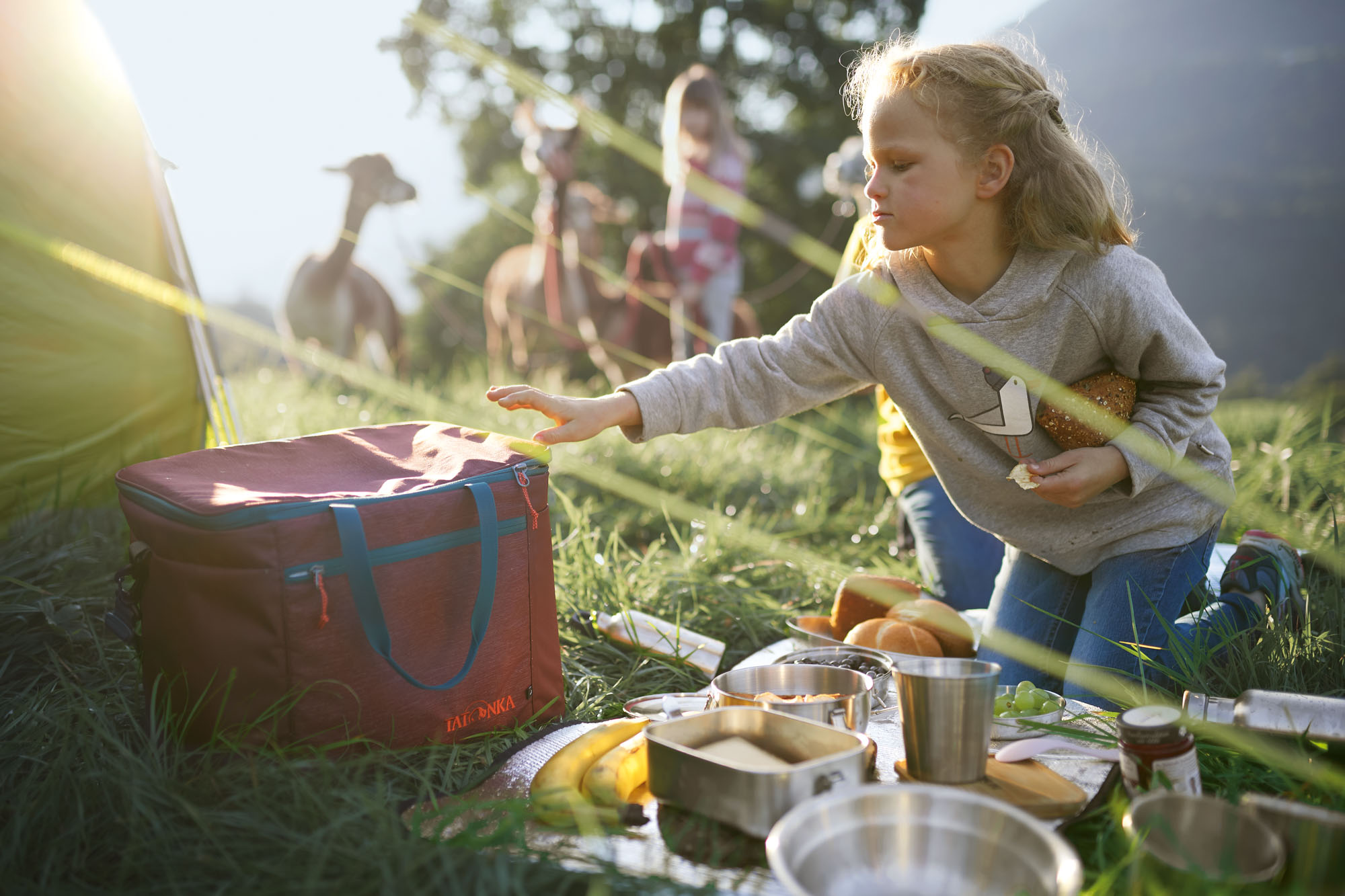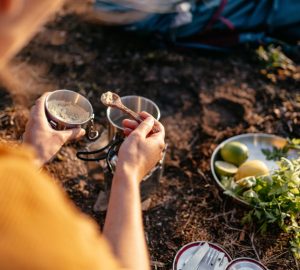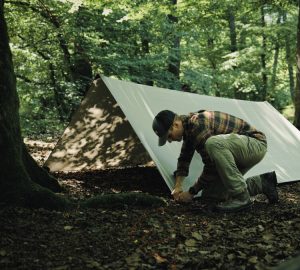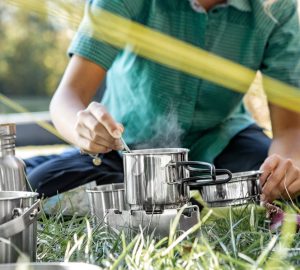Camping with kids can be so wonderfully uncomplicated. Camping with the family promises the perfect mix of nature, adventure and relaxation – but only if the planning is right. To make your family vacation in the tent an unforgettable experience, we tell you everything you need to know about preparation, equipment and how to react best when it rains.
Spending the night in a tent is always something special, especially for children: romping around outside all day and exploring nature – when is that possible in everyday life? In the evening, there’s a campfire with stick bread and grilled sausages until everyone crawls into their sleeping bags, listens to the sounds of the night for a bit and then falls asleep dog-tired. Admittedly: Things aren’t always quite so romantic. Sometimes you have to improvise a bit. But that’s just part of camping, and especially with children, these little adventures can be great fun.
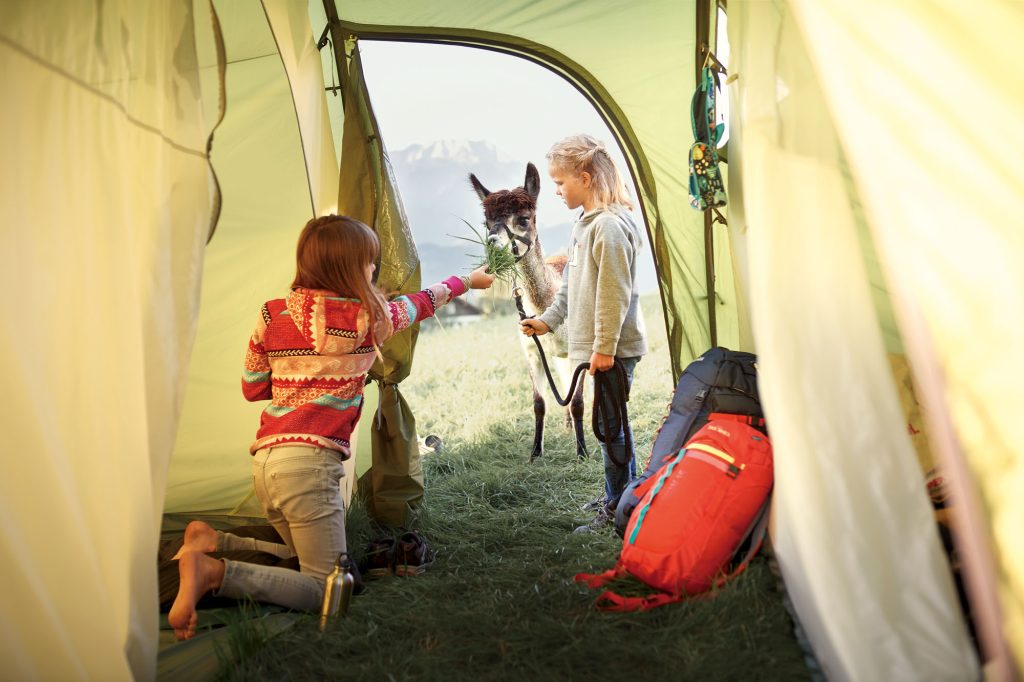
Which campsite is the right one?
With children, choosing the right campsite is enormously important for the success of the vacation. If there is enough to discover and experience, then boredom does not arise. This in turn suits the parents.
Water in the immediate vicinity of the campsite is a big plus here: whether a stream for building dams, a swimming lake for extensive rides on the air mattress or even a beach for sand castles. Even a small wood can be the purest adventure playground for children. Perhaps even the one or other vacation friendship arises.
It’s also important that the campsite is child-friendly and perhaps even has special offers for children – the easiest way to find this out is to research online, especially by looking at the reviews.
On the campground itself, you should also pay attention to a few things when choosing a site: It should be sheltered from the midday sun (nap time for small children), ideally also offer protection from rain, and not be too far from sanitary facilities. Be careful never to pitch your tent in a depression, so that it is not suddenly under water when it rains.
What do you need to camp with kids? The basics:
Less is more – this is especially true when camping. However, a few things are indispensable:
- A high-quality, spacious tent is probably the most important. In addition to the respective number of people, it should also have room for the luggage. In this tent comparison you will find more information about the right tent.
- High-quality sleeping mats and sleeping bags protect you from the cold at night – here it is recommended to buy thicker sleeping bags, because you can open the zipper and use them as a blanket if it gets too warm.
- A comfortable pillow will ensure a relaxed sleep.
- Thermal underwear, a jogging suit and a thin hat are also recommended in the summer to ward off the cold when the weather changes.
- A suitable camping stove as well as camping utensils (preferably made of stainless steel) ensure that your hungry family can properly fortify themselves after a day in the fresh air.
- If you’re traveling in a car and have the space, a folding table and camping chairs can make for much more comfortable eating. Purists rest and dine on a cozy picnic blanket.
- A flashlight or headlamp (with spare batteries / rechargeable) is indispensable!
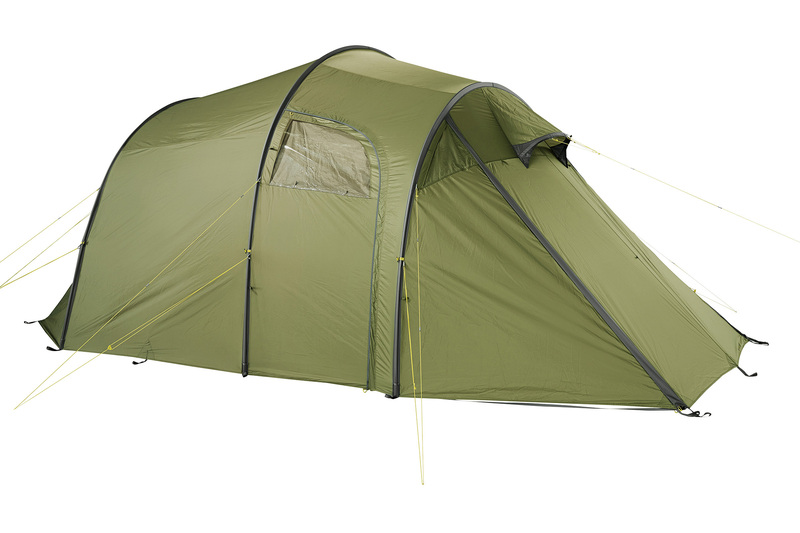
Family tents from 3 to 6 people. With multiple sleeping cabins, spacious vestibules, waterproof sealed seams and other useful features.
Packing list for camping with kids
Besides the basics mentioned above, you should have a few other things with you that will make your everyday camping life more comfortable:
- Appropriate clothing (depending on the season, location and weather)
- Swimwear and water wings
- Rubber boots
- Hygiene articles
- Sunscreen
- Towels
- Clothesline
- Multitool
- Lighter
- Washing-up bowl and washing-up liquid
- First aid kit
Especially for kids, you should think of the following:
- Children’s camping chair or travel high chair
- (Sand) toys and books against boredom
- Cuddly toy
- Sufficient supply of diapers / pacifier (depending on age)
- Sling / harness (depending on age)
- Child ID card
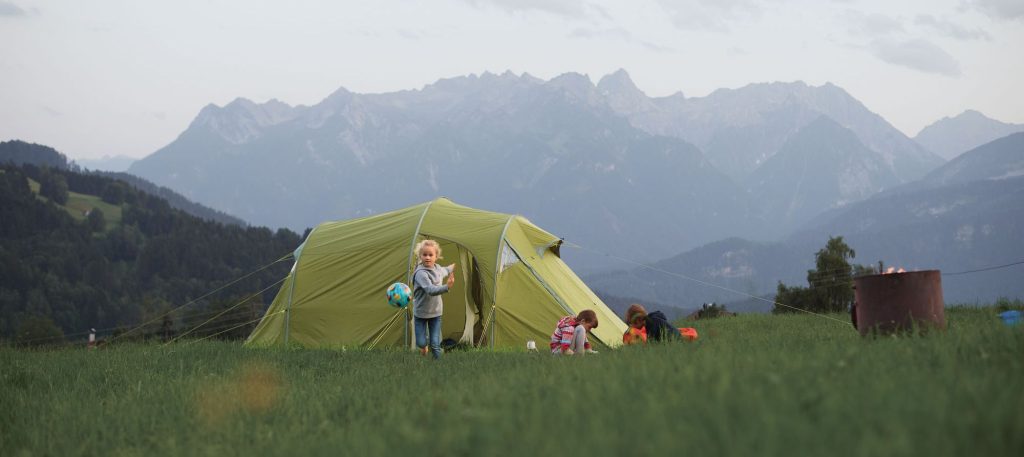
Cooking and eating while camping with children
Cooking for a whole family can be quite a challenge when camping, especially if you are used to cooking with a large stove and a well-equipped kitchen. When camping, things are a bit more spartan. After all, you usually only have a stove and a few pots available.
It’s best to choose a few dishes before your vacation that are easily doable. In addition, a few bagged soups and muesli bars are worthwhile if the hunger of the little ones suddenly becomes very large.
In addition, the rule applies when camping: barbecue is always possible.
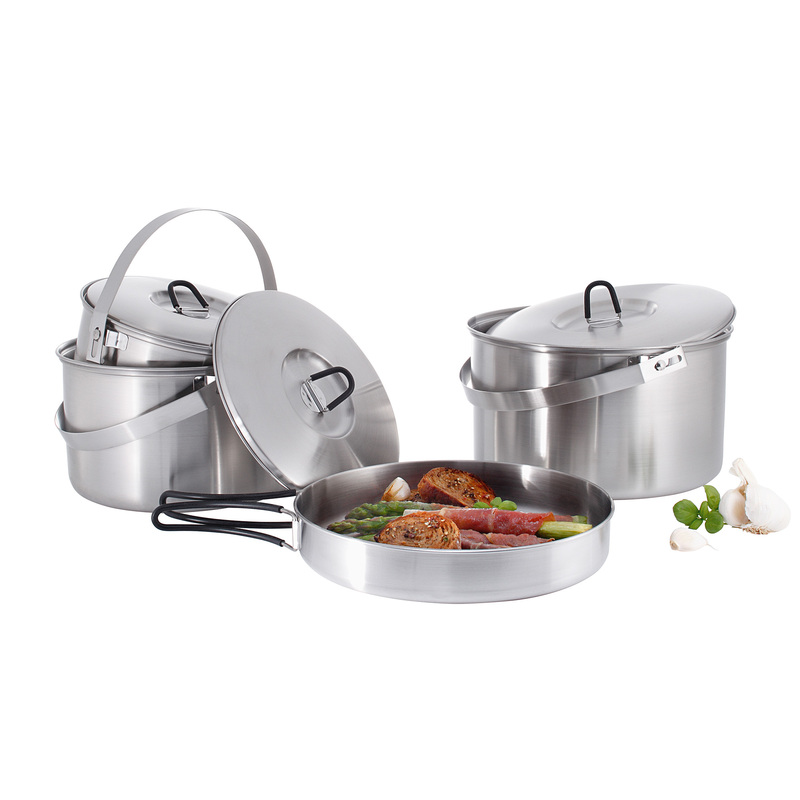
Relaxed cooking together with the Family Cookset consisting of
• 6 liter pot with lid
• 4.5 liter pot with lid
• 3.1 liter pot with lid
• Pan
• Transport bag
Protection from the cold when camping
During the day, as with all outdoor activities, the layered clothing principle is the best choice when camping – that is, wearing several layers of clothing on top of each other. This applies equally to children and adults. It’s also always worth packing thick clothes and especially rain gear, even if the weather is supposed to be nice. A storm is always possible and especially at night it can get very cold.
When sleeping in a tent, on the other hand, you should wear as few layers as possible, because a good sleeping bag reflects body heat and keeps you nice and warm. A thin cap keeps your head warm if it gets too cold.
The choice of sleeping pad is important. Here you should choose an insulated variant, which is somewhat thicker, so that the children do not get cold from the ground.
Camping in the rain: not the end of the world!
If you are surprised by a bad weather front during your camping vacation, that is no reason to take down the tents right away: If the tent is big enough, you can also eat in the sleeping cabins once. At the latest in this situation, the quality and waterproofness of the tent becomes apparent. An additional waterproof tent pad protects against moisture from below.
With a tarp you can protect the tent and its entrance from rain. Set up the appropriate tarp poles or tie the tarp to tree trunks. This way you also create a rain-protected play area for the children. When setting up the tarp, you should make sure that no water can collect on the tarp, so-called water bags, which can cause the tarp to collapse. By the way, a tarp is also suitable as a sunshade or as protection against moderate wind.
If you have a good deck of cards and a few creative ideas in your luggage, you can survive a rain shower relaxed. If it rains for a longer time, a plan B is worthwhile: How about an excursion to the indoor swimming pool, a museum or another suitable destination in the region?
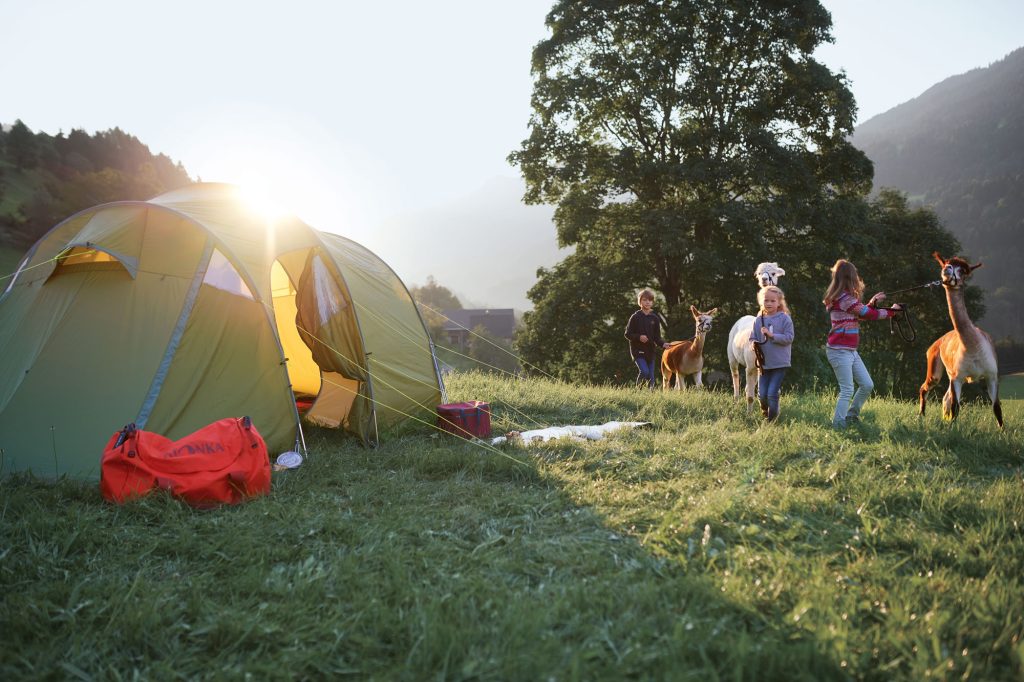
Do not forget insect repellent
You should never forget insect repellent when camping. Mosquitoes can be a real nuisance, especially in the evening. However, when buying insect repellent, make sure you buy one that is specifically recommended for kids. Children under the age of two should not be sprayed with insect repellent at all, as it can irritate their mucous membranes and cause allergic reactions.
You should also watch out for ticks. Long pants offer some protection here. Above all, you should check yourself and your children thoroughly for ticks after playing in nature. In case a tick has bitten you: Tick pliers or tick cards are recommended here! After removing the tick, you should treat the puncture site with disinfectant and then observe the site for several weeks. In case of doubt, it is best to go to the doctor. You should urgently refrain from using household remedies during removal (nail polish remover, alcohol, etc.). TBE vaccination is also recommended, especially in high-risk areas.
Conclusion: Just give it a try!
Camping with children is a great adventure for everyone involved. If you prefer to be on the safe side, you can first pitch your tent in the garden as a test run or spend the night at a campsite in the immediate vicinity. This way you can find out quickly and without risk if camping is the right thing for you and your family.




